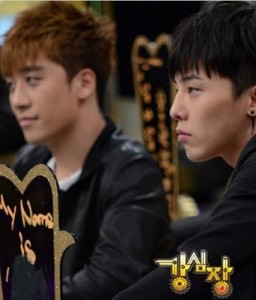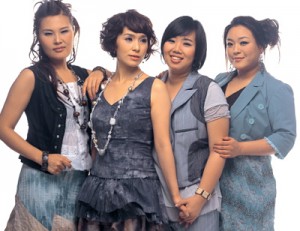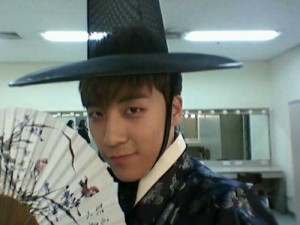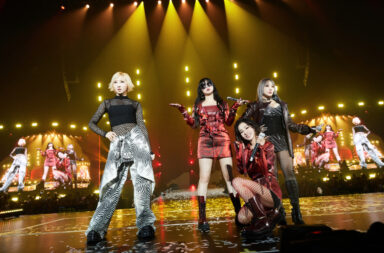 For this week’s Exchange, we take a short break from K-pop acts, and instead turn our attention to one of the producers of these acts, YG Entertainment.
For this week’s Exchange, we take a short break from K-pop acts, and instead turn our attention to one of the producers of these acts, YG Entertainment.
My first experience of YG came with my discovery of 2NE1, and though I’m familiar with some of YG’s artists and the western asethetic that is part of its defining style, there is a lot I am yet to learn about this company, which is considered as part of the big 3 record companies in the Korea. For example, I discovered only the other day that company founder and current president Yang Hyun-suk (AKA Yang Goon, or the guy in the hat on Kpop Star, or the most imitated man by idols on variety shows) was a member of Seo Taiji and Boys. And he had quite the moves, judging by this:
As awesome as his origin story is, though, it is in the past. Nowadays, Yang Hyun-suk is more well-known for running the record company he founded in 1996, itself renowned for its hip hop leanings and western aesthetic — and that’s pretty much all I’ve learnt from Wikipedia, so, I’ve roped in Nabeela, Johnelle and Fannie to share with me their inside knowledge on YG.
1.a) YG and its acts have amassed a noticeable international fanbase over recent years, but is it solely because of their hip hop sound (which is also popular globally) and more western sensibilities, or are there other factors at work that also attract international fans?
Nabeela: I definitely think focusing on hip hop music is what has allowed YG and his artists to reach out to such a large international fan base. If you really think about, K-pop itself has an iconic sound and a predictable image. In other words, we know K-pop when we see it, and we know it when we hear it. K-pop is categorized by certain familiar beats and rhythms as well as common images and concepts, and its called K-pop because, well, its popular in Korean. I think YG has global appeal because he makes his music something more than just K-pop. He makes music anyone and everyone could enjoy, from any part of the world, and a lot of that has to do with him focusing on broader and more established music genres like hip hop, R&B and house, rather than just K-pop all the time.
His western driven endeavors appeal both to Korean audiences as well as other foreign audiences for their western vibes, and they appeal to westerners for their relativity.
Johnelle: I definitely think their music is what attracts international fans at first. A lot of fans get into K-pop while looking for something new because they’re bored with the status quo, but we also tend to like things familiar which is why I think international fans gravitate to the more Western beats of YG artists. But I also think as fans begin to learn more about the groups once their interest has been piqued, it’s the members’ personalities that pull them in as full-fledged VIPs or Blackjacks, etc. YG is pretty good at presenting ‘the whole package’ with well rounded individuals who speak well (sometimes too well — gotta love Seungri), and can perform like few others. There is also the whole persona that YG’s groups are ‘artists’ and not ‘idols’ and are cooler because of that–they’re like the anti-idol idols. It’s a common thing that anti fans hold against YG talent and their fans.
Fannie: I agree that the overall sound and styling has to do with it, but something to add is that the company also has a different mindset towards how its artists and its concerts should be. YG artists are told to focus more on putting on a great performance full of energy for the audience, than being worried about the minute details of their choreography while on stage (of course, they practice a lot beforehand). YG artists come off as artists that know how loosen up and have fun with their music and with their audiences during concerts, and this more relaxed and mosaic factor is something that I think is attractive to international fans.
1.b) And with respect to domestic audiences, has their more western style made them more popular domestically? What about other aspects?
Nabeela: Like I said, of course YG’s western swag has appealed to Korean audiences for the same reasons western culture appeals to many countries all over the world. The difference is YG takes that western flavor and puts it into Korean music, making that style and appeal accessible to audiences of millions domestically in their own language. In my opinion, that innovation in itself is the sole reason YG and his artists’ music is so popular.
Johnelle: Yes, I do believe that domestically they became popular because of their Western edge both musically and conceptually. At the time of Big Bang‘s debut, I think they were the only idol boy band that had that edge to them. They were perfect for music fans that were a little bit older or a little more discerning musically who were ready to move on from bubble gum K-pop, but not quite ready to go hardcore into the indie, hip hop, or rock scene. It was the same with 2NE1. I also think some fans liked that they were known as the ‘ugly’ idols and that they didn’t rely on looks for their career.
Fannie: Big Bang and 2NE1 both brought something new and fresh to the Korean scene when they came out. There may be a lot of music similar to the styles of these two groups nowadays, but they will always stand out because they were the original pioneers of these trends, rather than the followers. YG artists certainly aren’t everyone’s cup of tea domestically (nor internationally), but the fact that their company always tries to take an unconventional approach and carve out paths rather than follow them, always seems to set its artists apart from the crowd.
 2. It is often said that K-pop runs on the mantra “out of sight, out of mind”, yet YG artists seem to be doing OK without constant variety show and music show appearances. What are your thoughts on this strategy? Is this a perk that comes from being a YG artist? Because I can’t see other companies’ artists being able to pull this off…
2. It is often said that K-pop runs on the mantra “out of sight, out of mind”, yet YG artists seem to be doing OK without constant variety show and music show appearances. What are your thoughts on this strategy? Is this a perk that comes from being a YG artist? Because I can’t see other companies’ artists being able to pull this off…
Nabeela: From what it looks like, YG is aware of the sheer amount of time and energy it takes to do promotional activities, and has instead decided to invest that same time and energy right back into his groups’ promotional music. The most apparent result of this strategy I guess is that when I think of big YG names like Big Bang and 2NE1 and Se7en, I don’t think about their variety skills or their on-camera personalities–I think about their high energy, high quality music. I think that’s why a lot of fans of YG artists have patience–they know whatever they are waiting for is bound to be worth it because YG has a reputation for some of the best, most thoughtful music in the industry, and that those artists don’t need much else besides their music to promote themselves.
Johnelle: I think YGE can get away with this because they have mastered the “Less is More” concept. It’s not like Big Bang or 2NE1 never were on variety shows, Big Bang was introduced to the public through their documentary on Mnet before their debut and 2NE1 had 2NE1TV. YGE is just really selective about which shows their artists, whether individually or collectively, are on and they make the most of those appearances. While YG artists aren’t constantly on shows and in your face like other companies’ artists, they do regularly have their artists doing something to keep fans interested, whether it be group activities, solo projects, concerts, CFs, or their own shows (e.g. BigBangTV and 2NE1TV). YGE also happens to be one of the best at using social media and the internet to its advantage having things like YGLIFE.com, YouTube channels for all their artists, their new YG app, etc. to keep in touch with fans.
I think their artists’ schedules are carefully crafted plans that allow their artist to pursue their interests while keeping their group work relevant. When you think about it, wouldn’t you anticipate your favorite idol’s appearance more if they’re not always on TV? Of course you need to have achieved a certain level of popularity for this formula to work.
Fannie: For YG artists, music shapes their image, rather than the other way around. For solo artists such as Se7en and Gummy and Psy, and groups such as Big Mama, they are selling their brand off of their music and performances, not their personality. Big Bang and 2NE1 are idol groups, but we still get a good look at their (projected) personalities through their music. For 2NE1, rather than adopting an altogether different external identity for each promotion, we instead get to see a different internal facet of the girls (confident, insecure, lonely, etc.) with each song. There’s consistency. For Big Bang, we get to know the individual (projected) personalities of the members through each of their solo efforts.
Of course variety shows and documentaries do help, and their idea of distributing subbed videos of 2NE1 TV directly off of their YouTube channel is ingenious, but I tend to think that for YG artists, the initial hook for their fanbase isn’t their personalities or looks (that attachment forms later on down the road), but rather their music and performances. I think there’s also this mysterious quality about the company and its artists (from being elusive) that makes people curious as well.
3. Whenever YG is praised for not being like the other companies and always putting talent first, I can’t help but think of TOP’s rejections until he lost weight, Bom’s diets, underage Minzy in dominatrix gear, Dara’s inclusion into 2NE1… however, YG is seen as one of the better companies in terms of talent management; what has YG been able to do that other companies seem unable (or unwilling) to do?
Johnelle: I think the thing about YGE is that a YG artist has to have talent and something about them that stands out, whereas with some of the other companies you only had to have looks and they’d then train the skills into you. In a perfect world people would be able to succeed based on their merits, but we don’t live in a perfect world and YGE is a business and as a business they know that in the ROK appearances are everything. So, it’s not like they can overlook appearances.
The difference is that if you had talent, desire, and the willingness to work your ass off (in more ways than one), YG gave you a chance. TOP didn’t only have to lose like 10 lbs, he lost a significant amount of weight–and people still gave him shit about it when they debuted (which is why I think he never takes off his clothes). But YG told him that if he wanted it, to lose weight and he’d give him a chance. Same with Daesung, if you look at his early pictures (and I say this with love because he’s my favorite) he was not the best looking kid on the block. But he had a great voice, the desire to be a singer even against his father’s wishes, and the ‘smile of an angel.’ As for Dara, her talent wasn’t so much her singing or dancing capability, but her personality, desire, and willingness to work hard to become a singer. And don’t forget YG was responsible for the debut of Big Mama, who as four women with huge voices and full figures was groundbreaking at the time.
The reason why YG is considered by so many to be one of the better management companies is because they take care of their artists: they don’t overwork them as much as others, they give them freedom to pursue solo activities and other interests, and they’re fair–I’ve never heard any YG artist complain about money issues.I really do think that once you’re in YG you’re like family- they take care of their artists and protect them. I think they can do this because they are very selective of the trainees and talent that they manage and keep the amount of trainees and artists to a number they can successfully handle. They’re not perfect, artists have left the company like Wheesung and Big Mama due to creative differences and management disagreements, but I do still think they’re one of the better management companies in K-pop.
Fannie: YG as a company encourages individual growth, and legitimately wants each and every one of its artists to reach their full potential and be able to stand on their own. This is why each member of Big Bang has been given a chance in the past to pursue solo promotions. How many other idol groups have been able to echo that claim? (I can only think of the Brown Eyed Girls, but it’s debatable whether they are actually an idol group or not). I think the idols under their management are generally happy because their individualism isn’t being suppressed; it’s being encouraged to foster and continually grow. I think that something that is especially telling of this fact is the recent case of Tablo‘s transition into the company. Becoming a YG artist did not in any way negatively impact his individuality or artistry (unlike what many had feared), but rather provided a safe environment for it to grow.
 Another thing is that YG doesn’t waste its talents. Minzy dances and dresses provocatively at times, because it’s something that comes to her naturally, rather than forced. YG added Dara to the team not only because she had the determination and the star-quality looks, but also because she had extensive experience with handling the public spotlight in the past (in the Philippines), and the team needed someone with this kind of experience to guide them. Dara may be the face of the group, but she isn’t given an inappropriate amount of focus during their songs (a la Sohee). Instead, YG plays to her strengths, which is a combination of her face and affinity for public relations, letting the other girls shine where they need to, as well. Without Dara and her frequent me2day updates, we would probably only get half the amount of news out of 2NE1 that we normally get. Everyone is used to their fullest ability, in the ways that are the best suited for them. You know, it really makes me wonder what someone like Hyoyeon or Bekah could have become had they been contracted under YG.
Another thing is that YG doesn’t waste its talents. Minzy dances and dresses provocatively at times, because it’s something that comes to her naturally, rather than forced. YG added Dara to the team not only because she had the determination and the star-quality looks, but also because she had extensive experience with handling the public spotlight in the past (in the Philippines), and the team needed someone with this kind of experience to guide them. Dara may be the face of the group, but she isn’t given an inappropriate amount of focus during their songs (a la Sohee). Instead, YG plays to her strengths, which is a combination of her face and affinity for public relations, letting the other girls shine where they need to, as well. Without Dara and her frequent me2day updates, we would probably only get half the amount of news out of 2NE1 that we normally get. Everyone is used to their fullest ability, in the ways that are the best suited for them. You know, it really makes me wonder what someone like Hyoyeon or Bekah could have become had they been contracted under YG.
4. YG’s roster of artists comprises mostly solo acts, and even with Big Bang and 2NE1, solo activities for members were encouraged and supported. But will this approach still be viable with YG’s upcoming girl group? There will be 5-7 members, according to reports — would the larger group size impact their chances of solo activities? How so? And do you think there would be any other differences in management style due to the size?
Nabeela: I don’t see why they would be discouraged from solo activities. If anything, I would think they’d be doubly encouraged to do so considering the larger number of members. That way as one does solo works, the others can rest, and they can all eventually cycle through the soloist realm. As far as management goes, I don’t think anything will change dramatically. Whether is 1,4,5,6,or 7, I’m pretty sure YG knows what he’s doing.
Johnelle: YG is a savvy businessman and has a good management team at his side. I think they always have a game plan for their artists and know exactly how they will handle their artists’ careers. I don’t think that the larger size of the upcoming girl group would have any impact on the management style as it exists now–it’s probably even part of the reason some of these girls joined YG.
I do believe though that YGE would make them concentrate on their group activities first and that the group must be performing at a certain level of success before any of the members would be allowed to engage in any solo activities. If the group is successful and the members all pursue solo activities, YGE is at a level of financial stability where they can just hire more staff to handle the increased management duties to oversee their new girl group.
– – – – – – – – – – –
I was initially of the opinion that incorporating western music genres like hip hop and house was the main reason why YG artists were popular — not only did it differentiate them from other companies, but I felt that the whole western aspect would especially appeal with Koreans. And while that is true, I never really considered other reasons, like being able to listen to such music in their own language, that would also attract Korean audiences, in addition to the fact that Big Bang and 2NE1 (but Big Bang more so) were first of their kind in the idol scene. And with respect to using YG’s music as a stepping stone between bubblegum pop and other genres, it can work the other way too: international fans may use the same music as a way to ease their way from the western style of music they may be used to into more traditional K-pop fare.
The focus YG places on talent seems pretty obvious, but looking at other companies and some of their recruits, it does not seem to be as straightforward as I thought it would be. I never considered Dara’s PR skills as factoring into YG’s decision to put her in 2NE1 — I was under the impression that YG placed emphasis on musical or artistic talent, but seeing the way he takes other skills into consideration too is really interesting. This thought process is also evident in the decision to include Seungri in Big Bang and not Hyunseung: Seungri had the confidence that Hyunseung lacked, and this has translated into greater publicity for Big Bang through their maknae’s many antics on variety shows. Sometimes I wonder if Yang Hyun-seuk ever rues that decision… If I were to ask him why his artists rarely turn up on shows, and he merely pointed at Seungri in response, I would completely sympathise with him — and then call him a killjoy because he’s the best part of the show whenever he’s on!
I, for one, am really excited for YG’s new group — I intend to make it the first debut I follow closely and properly, like I did with Super Junior’s latest comeback, experiencing first-hand the process of a debut in K-pop (I’ve decided that EXO does not count). I agree with Johnelle that the group would first have to achieve some level of success before member started going solo, but I am glad to hear that it is a distinct possiblity — regular solo activities seems to be another defining feature of YG, and if anyone can successfully pull of solo ventures for a seven-member group, then it seems that YG is the ideal candidate.
I remember comparing SHINee to a Christopher Nolan film in my first SB Exchange; if I were to follow the same metaphor, then YG Entertainment would be a collection of Mani Ratnam films: revolutionary; different from other films; not coming out that often; somehow appearing foreign while still retaining a local flavour; with the occasional flops; the artists weren’t always the best-looking; and the material produced in his native language is much better than that produced in a language that is seen as leading to greater exposure and more profits. Oh, and the music is always the best part.
So, readers, what are your thoughts on YG? Did you use YG’s music as a platform from which to dive into “normal” K-pop? And, just out of curiosity, who’s your favourite YG artist?





